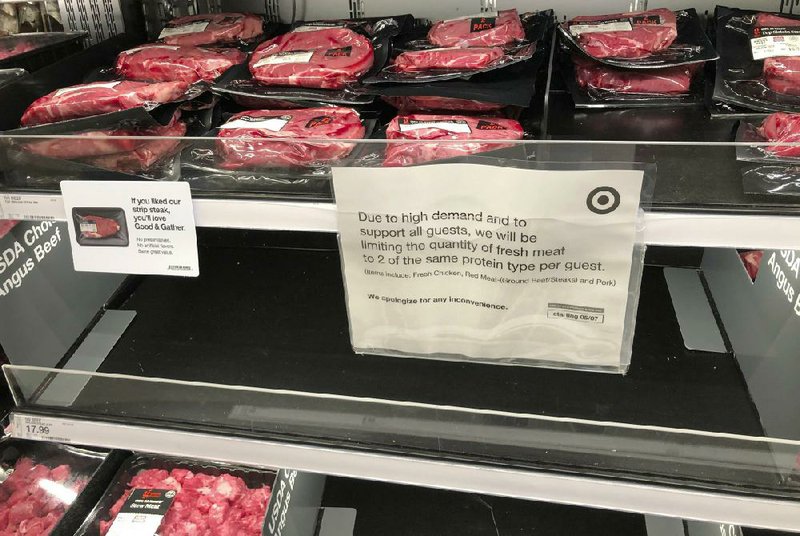Cattle ranchers have been put through the wringer this year because of the coronavirus pandemic.
Retail beef prices soared as meatpacking plants slowed or closed production, resulting in a cattle glut that pushed cash prices down more than 30% since January, data show. Many restaurants, which account for half of the nation's beef demand, were closed and slow redistribution of products kept grocery store shelves and meat cases bare for weeks.
With cattle prices low and processing capacity down because of the coronavirus pandemic, ranchers have been keeping their cows in pasture as long as possible and looking for other ways to be profitable, said Travis Justice, chief economist of the Arkansas Farm Bureau.
Thousands of ranchers have also applied for financial aid to help recover from losses brought on by the coronavirus.
[CORONAVIRUS: Click here for our complete coverage » arkansasonline.com/coronavirus]
The crisis has renewed public interest in finding local meat sources and from farmers looking to sell products direct to consumer. Demand has grown over the years and "the pandemic has just accelerated that," Justice said. There aren't enough small meat processors to handle demand, however.
There are only three small meat processors in the state that offer federal inspection, a factor that allows producers to sell retail meat. About 30 processors offer custom slaughter but are not federally inspected. They're often only busy during the fall months for deer season. According to a study this week by the Arkansas Beef Council, only one outfit offered a federally inspected beef service in the state.
Part of the problem is how slaughtering is done today. In Arkansas, ranchers raise cattle on grass and then ship them to feedlots before they are purchased by Tyson and others for slaughter. As meatpacking workers tested positive for covid-19 and began missing work across the U.S., several plants that slaughter millions of animals a day closed or slowed temporarily. This disrupted the supply chain and markets, causing farmers to cull chickens and hogs. Cattle ranchers are keeping their herds in pasture longer.
The number of cattle sold in Arkansas for processing fell 27% after President Donald Trump declared the coronavirus a national emergency, according to a Beef Checkoff report. There were 54,600 head sold until mid-April, down from 75,200 in the same period last year.
Justice said it was difficult to measure the coronavirus-related backlog of cattle in the state. He pointed to a May report that showed the number of cattle sold was down 2% from a year ago, a hopeful sign of recovery.
"Prices have stabilized a little bit," Justice said, but not where they were months ago. Packers such as Tyson Foods, Cargill and others paid on average about $1.10 per pound last month for live cattle, up ten cents from April, according to a commodity report from Stephens Inc.
As markets start to recover and processing plants come back online, farmers are signing up for aid to help with their virus losses.
Arkansas livestock producers have received $10.1 million from the U.S. Department of Agriculture's coronavirus food assistance program, recent data show. Dairy farmers and producers of some row crops and specialty crops have received another $1.8 million.
Plans to develop a state meat inspection system have been in the works with support from lawmakers. Justice said it would take new legislation for any plan to work. Several processors don't offer USDA inspection because they have labor and cost concerns, according to the Arkansas Beef Council. While they are interested in a state inspection program and adding a retail component to their business, processors were unsure if their clients would benefit from such a program.
Meanwhile, ranchers are struggling to sell cattle. Jason Apple, a meat science professor at Texas A&M University, Kingsville, said he has seen wait times as early as November and as late as February of next year for beef slaughter. A month was considered a long wait before the pandemic.
Apple said because of this, farmers are turning to small processors where they can during the pandemic.
Business on 06/06/2020
